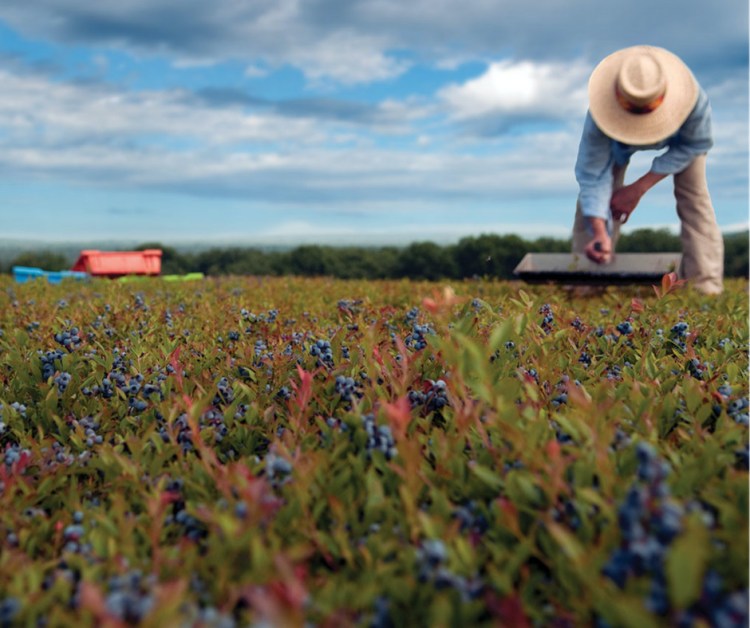Maine’s wild blueberry growers looked at the massive success of Maine Maple Sunday over the years and began to wonder if they could do something like that themselves.
Turns out, they can.
The first Maine Wild Blueberry Weekend will be held Saturday and Sunday at farms, restaurants and other locations around the state. Some 15 blueberry farms stretching from the midcoast to Down East will open up for tours, workshops, demonstrations and treats. Some might let you rake or pick the berries yourself, others might let you watch a harvest in process. The farm open houses are free, but of course the farmers hope you buy their wares. There’ll also be food trucks, cocktails or other food and drink for sale at some.

Gelato Fiasco’s Maine wild blueberry flavor will be part of Maine Wild Blueberry Weekend Saturday and Sunday. Photo courtesy of Gelato Fiasco
The weekend also includes more than four dozen Maine businesses – restaurants, bakeries, ice cream makers, brewers and wineries – putting a spotlight on blueberry versions of what they sell. You can get blueberry pie, blueberry bread and a blueberry lemonade cocktail at Mabel’s Lobster Claw in Kennebunkport or a Sea to Summit lager, brewed with blueberries, from Baxter Brewing in Lewiston. A list of all the farms and other businesses participating – including what each is offering and contact information – can be found at wildblueberries.com.
Ron Howard, a seventh-generation blueberry farmer, says he’d love for this new event to make people more aware of local wild blueberries, in the same way that Maine Maple Sunday has helped people around the state discover how much maple syrup is made here.
“We felt like there was a lack of understanding about what wild blueberries are,” said Howard, of Brodis Blueberries in Hope. “My dream is that everybody sits down with some wild blueberries and some cultivated ones and then they could really see and taste the difference.’
Some of the main differences are easy to see. Maine wild blueberries are generally a lot smaller than cultivated blueberries, and they grow, as the name suggests, wild on bushes that are very low to the ground. Cultivated blueberries are often called high-bush blueberries because they grow on bushes that you don’t have to stoop over to reach. Picking Maine blueberries can be back-breaking.
Wild Maine blueberries are sweeter – try for yourself, as Howard suggests – and have a softer texture, better for pies and pastries, said Howard. Maine wild blueberry farmers don’t plant and cultivate their crops, they basically manage land with wild blueberries growing on it. He said most farmers burn or prune part of their fields ever year, as that method has proven to bring back the blueberries stronger and more plentiful the next year.

Maine wild blueberries are easy to spot because they’re smaller than cultivated ones. Photo courtesy of Wild Blueberry Association of North America
Howard said he thinks this year is a perfect time for a Maine Wild Blueberry Weekend because the pandemic has made a lot of people more interested in local foods and supporting local food businesses.
Getting people to appreciate Maine wild blueberries now is especially important because of the increased competition from cultivated blueberry growers, said Patricia Kontur, program director with the Wild Blueberry Commission of Maine. The number of states where blueberries are cultivated has grown from about 15 or 20 a few years ago to 35 today, Kontur said. Maine blueberries are harvested in the summer – usually July or August depending upon the part of the state – while cultivated blueberries grown in warm-weather states can be harvested much of the year.
The closest farms to Portland participating in Maine Wild Blueberry Weekend are in the Camden area, including in Hope, Appleton and Union. At Ridgeberry Farm in Appleton, people can see machine harvesting and watch a demonstration of hand-raking. There will also be tours. Gunslingers BBQ will be grilling up food with Ridgeberry Farm Blueberry BBQ sauce.
At Brodis Blueberries in Hope, there will be spirits and cocktails from Blue Barren Distillery, as well as wine from Bluet Sparkling Wine, and other locally made products and local food trucks. People can enjoy their food with a view of Alford Lake and the surrounding mountains. People can pick their own samples and listen to a reading of Robert McCloskey’s classic Maine-set children’s book “Blueberries for Sal” each day at 10:30 a.m., following a hike of the farm.

Sample fresh picked berries from a local farm during Maine Wild Blueberry Weekend. Photo courtesy of the Wild Blueberry Association of North America
For people who want take a drive Down East, there are farms participating in Cherryfield, Harrington, Addison and Roque Bluffs, among several other places.
At Smithereen Farm in Pembroke, visitors can book campsites in the blueberry fields, some of which overlook Young’s Cove. Besides picking blueberries, people can also enjoy a family-style clam chowder and pizza dinner and see a screening of the film “Voices from the Barrens, Native People, Blueberries and Sovereignty.” Hand-churned ice cream and other blueberry treats are for sale, and there will be cooking workshops for $20 per person.
At Welch Farm in Roque Bluffs, people can take a 90-minute tour that starts in the blueberry fields – with harvesting and raking demonstrations – and then leads to the factory where the berries are sorted, cleaned and packed for shipment to wholesale and retail markets. The tour finishes at the farm store.
“We’d really like to do what Maine Maple Syrup has done,” said Howard. “We hope this helps us connect with people and get them out to the farms.”
Send questions/comments to the editors.



